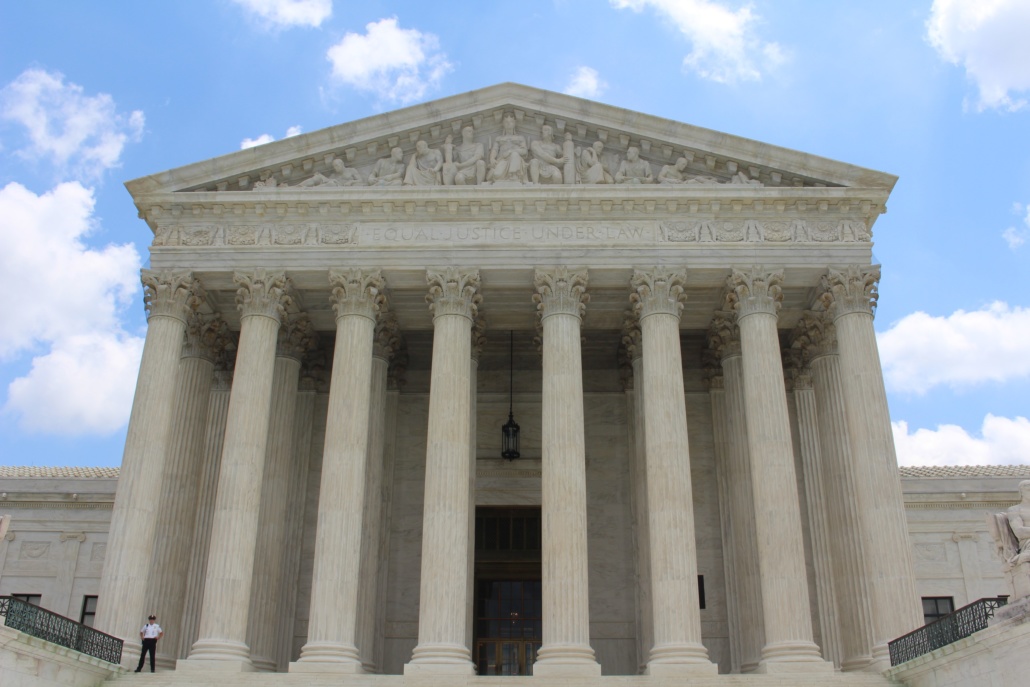A win for the Trump administration: SCOTUS upholds fast-track deportations of denied asylum seekers
by Aysha Qamar
The Supreme Court of the United States (SCOTUS) ruled that previously denied asylum seekers cannot challenge their fast-tracked deportation cases in federal courts in a 7-2 decision Thursday. The court found that expedited deportations for migrants at or near the border who fail initial asylum screenings does not violate due process rights or constitutional protections against unlawful detention, the Associated Press reported. The decision comes as a victory to the Trump administration that aims to make immigrating to the country and seeking asylum more difficult.
Writing for the majority, Justice Samuel Alito reversed a lower-court decision that ruled asylum-seekers must have access to federal courts. The court upheld that those who are unable to initially prove their need for asylum or “credible fear of persecution or torture” are not entitled to seek habeas corpus. Under a 1996 law, those who fail asylum screenings are placed in a system of immediate removal without seeing a judge. Alito applauded the 1996 law and wrote that Congress properly created a system with the ability of “weeding out patently meritless claims and expeditiously removing the aliens making such claims from the country.”
Alito also noted that more than three-quarters of those who have sought asylum in the past five years passed their initial screening. His note failed to acknowledge the increased use of the process under the Trump administration and its intentions to expand its power of rejecting asylum seekers.
In September 2019, the administration expanded the 1996 law in question to undocumented migrants throughout the country, who had been in the U.S. for up to two years. Prior to the expansion, the law only applied to those detained within 100 miles of the border and within two weeks of their arrival to the country.
Thursday’s case focused on an asylum seeker from Sri Lanka, Vijayakumar Thuraissigiam. Thuraissigiam, a farmer, sought asylum after being abducted from his fields, arrested, and blindfolded by men in a van who then interrogated and beat him so badly that he wound up in the hospital for 11 days. He then fled his country and journeyed for seven months first to arrive in Mexico then to the U.S. to seek asylum, NPR reported.
Thuraissigiam identifies as Tamil, an ethnic minority in Sri Lanka with a history of persecution at the hands of the Sinhalese government in Sri Lanka. According to NPR, his abduction follows a pattern of violence carried out against the ethnicity there. During a hearing, an immigration officer said he believed Thuraissigiam, yet denied his claim for asylum because Thuraissigiam was unable to identify his abusers. The decision was upheld in a 13-minute hearing with an immigration judge resulting in Thuraissigiam being ordered to deport back to Sri Lanka, according to NPR.
But while this judge ruled against him Thuraissigiam, the Ninth Circuit Court of Appeals supported Thuraissigiam and ruled that he had been denied due process. Thuraissigiam had filed a habeas corpus petition under the grounds that if deported to Sri Lanka, he would face danger as an ethnic minority.
Trump’s conservative high court supported Alito’s racist opinion claiming majority asylum seekers are “meritless,” in addition to Justices Ruth Bader Ginsburg and Stephen Breyer who while supporting the ruling filed a concurring opinion. Justices Sonia Sotomayor and Elena Kagan dissented the court’s decision stating that ruling: “Today’s decision handcuffs the judiciary’s ability to perform its constitutional duty to safeguard individual liberty and dismantles a critical component of the separation of powers.”
American Civil Liberties Union (ACLU) attorney Lee Gelernt, who argued the case on behalf of Thuraissigiam spoke against the decision in a statement Thursday. Gelernt had previously argued against the 1996 law in the Supreme Court in March. “This ruling fails to live up to the constitution’s bedrock principle that individuals deprived of their liberty have their day in court, and this includes asylum seekers,” Gelernt said. “This decision means that some people facing flawed deportation orders can be forcibly removed with no judicial oversight, putting their lives in grave danger.”
The asylum-seeking process in its entirety is lengthy and excruciating, even for those who pass their initial screenings. Those who pass the initial screening are able to make their case in U.S. immigrant court; according to Vox, on average pending cases wait about two years to have their case heard in court.
The Trump administration, which has expressed clear intention to expand its changes to the asylum process, has already made significant changes in addition to announcing new rules. A new rule was announced on Monday in which the Trump administration limited the eligibility of employment authorization for asylum seekers; the rule is stated to go into effect on August 25. According toThe Guardian, the administration has allegedly made the asylum seekers wait in Mexico as their cases are fought in U.S. immigration court, in addition to flying Hondurans and El Salvadorans to Guatemala to seek asylum there instead of the U.S.
According to the United Nations, the U.S. became the world’s top choice for asylum in 2017, with a majority of asylum seekers from Central America, the AP reported.
This story was first published on Daily Kos
















2020
860 views
views
0
comments